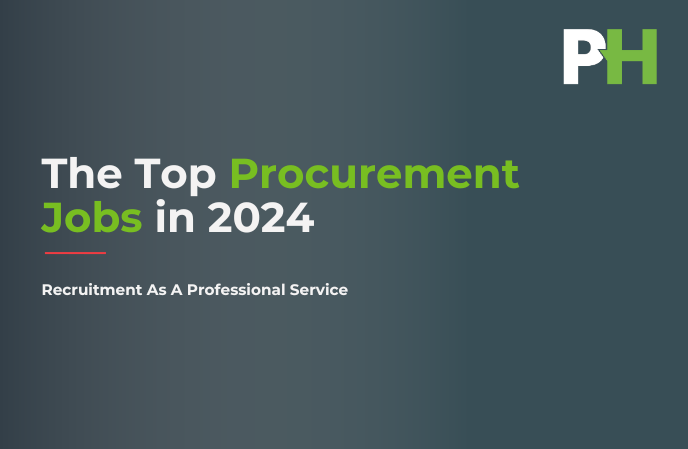Our consultants, specialise in connecting top talent to find the next step in their Procurement Career across a range of fields, including the Consumer, Financial & Professional Services, Industrial, Pharmaceutical & Life Sciences and Public Sectors.
In a fast-paced and ever-changing field, Procurement has adapted and evolved from its traditional role of simply purchasing goods and services. Jobs in Procurement play an important role in managing relationships, improving cost efficiency, and ensuring the quality of goods and services.
And, as businesses around the world continue to expand into new markets, the demand for Procurement experts will only continue to grow.
Read on to discover the top roles in Procurement in 2024 and the skills you’ll need to succeed.
Category Specialist & Category Manager
Category Specialists typically analyse and control the purchasing, supply and distribution of an organisation’s goods and services. This role involves negotiating terms and conditions for suppliers and their contracts with a focus on building and maintaining strong working relationships.
If you’re considering a Procurement career as a category specialist, you’ll typically need a bachelor’s degree in a related field such as business, commerce or economics. You’ll also benefit from strong communication skills, time management and an understanding of the latest trends in the field.
After gaining valuable experience as a category specialist, you’ll likely have the opportunity to develop your skills to progress into a management position.
In a Category Manager Job, you’ll be responsible for the strategy behind the team’s delivery. You’ll need to be able to foresee upcoming trends in the sector and forward-plan around these trends. You’ll need to be comfortable negotiating contracts by speaking to senior stakeholders and fostering valuable client and supplier relationships.
Procurement Analyst
Usually reporting to the senior management team, Procurement analysts play an essential part in securing contracts by providing essential insight into market trends and spending. They conduct and present research to evaluate suppliers, taking into account key factors such as cost, speed and quality.
They also ensure companies and suppliers are working in line with industry standards and complying with procedures set by bodies such as the PRA and FCA.
To become a successful procurement analyst, you’ll need to be comfortable researching, processing and presenting information and data to senior stakeholders and clients. With a keen focus on data analysis, you’ll be an avid number-cruncher and able to confidently present your findings to your team and suppliers. Many procurement analysts started their career journey in entry-level procurement positions, Procurement Consultant roles, and have progressed their way to analyst roles.

Supply Chain Risk Manager:
As a Supply Chain Risk Manager, you’ll be involved in analysing an organisation’s supply chain to uncover inefficiencies, influence spend and establish best practices. You’ll be a keen problem-solver and be able to analyse data and suppliers to fully understand the risk involved in working with them.
Supply Chain Risk Managers often hold a leadership role in an organisation and will report to the Senior Leadership or C-suite team. You’ll need to be confident in negotiating and liaising with stakeholders and suppliers, as well as managing a team.
Many Supply Chain Risk Managers started their journey in a graduate or entry-level role such as a Procurement Expert. They then gain valuable experience in supply chain roles to progress into management. Like any management role, communication and people skills are essential.
Senior Procurement Manager
Senior Procurement Managers are responsible for ensuring that goods and services are procured with the highest possible quality and at optimal cost levels. They’ll assess and assign resources and costs to procure the goods and services, as well as evaluate efficiencies and ensure organisations and suppliers are complying with best practices and relevant procedures.
Additionally, they often work at a strategic level to set the global plan for procurement. This involves having thorough knowledge of the supply chain space and foreseeing potential risk factors that may affect suppliers and vendors.
To become a Senior Procurement Manager, you’ll usually start as a Procurement Expert. You’ll gain hands-on experience and work as part of a team. You can then develop your skills and progress into a management role.
Chief Procurement Officer
As the most senior procurement role, the chief procurement officer typically sits in line with the Chief Operating Officer or the Chief Financial Officer. They are usually in charge of an organisation’s contracting services and will manage the purchase of supplies, equipment, and materials. This will involve setting the overall procurement strategy and occasionally supporting high-level contract negotiations.
You’ll need to have a wealth of experience in the procurement field and be a confident strategic business leader. In larger organisations, the CPO may manage a team of hundreds of specialists, so people management skills are a must-have.
To find out more about a career in recruitment, get in touch with one of our experienced Procurement Recruitment specialists who will be happy to help you on your procurement journey.





